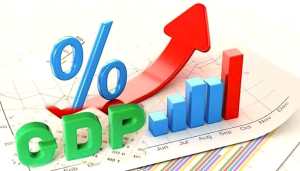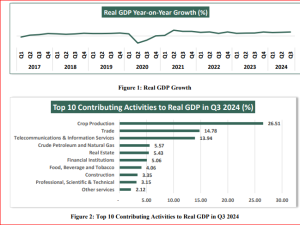
Nigeria’s economy displayed notable resilience in the third quarter of 2024, recording a 3.46% year-on-year growth in Gross Domestic Product (GDP), marking a clear upward trajectory from the 2.54% growth recorded in the same period of 2023. This impressive performance surpassed the 3.19% growth recorded in Q2 2024, signaling a robust recovery across key sectors. The latest GDP report from the National Bureau of Statistics (NBS) underscores the country’s economic progress, as both the oil and non-oil sectors contribute to the overall growth.
Services Sector: Leading the Charge for Economic Growth
A major highlight of the report is the stellar performance of the services sector, which grew by 5.19% year-on-year, contributing a substantial 53.58% to Nigeria’s aggregate GDP. This expansion is reflective of the ongoing transformation in the country’s economy, as services continue to play an increasingly significant role in driving economic activity. Key areas within the services sector, including telecommunications, information services, and financial institutions, have been pivotal in spurring this growth. With the rise of digitalization and the increasing demand for connectivity, telecommunications and financial services are expected to remain central to Nigeria’s economic diversification efforts.
The expansion in services is a promising sign for the Nigerian economy as it shifts away from an over-reliance on the oil sector. This shift, supported by strategic investments in infrastructure and technology, highlights the potential of the services sector to continue driving future economic growth and development.
Oil Sector Recovery: A Crucial Contributor to GDP Growth
While the services sector has taken center stage, Nigeria’s oil sector has also shown strong recovery. The country’s oil sector recorded a 5.17% growth in real terms for Q3 2024, marking a significant turnaround from the -0.85% contraction seen in Q3 2023. This rebound is largely attributed to a steady increase in oil production, with average daily production climbing to 1.47 million barrels per day (mbpd) in Q3 2024, up from 1.45 mbpd in the same quarter last year.
This growth in the oil sector, although slower than the explosive gains seen in Q2 2024, remains a critical contributor to the nation’s economic performance, accounting for 5.57% of total GDP. Despite efforts to diversify the economy, the oil sector continues to be a vital part of Nigeria’s financial backbone, underscoring the importance of sustained investment in oil extraction and production technologies.
Non-Oil Sector: Diversification Pays Off
In line with ongoing efforts to diversify the economy, the non-oil sector continued to show steady progress. The sector expanded by 3.37% in real terms, surpassing the 2.75% growth recorded in Q3 2023 and the 2.80% growth in Q2 2024. This performance highlights the success of diversification strategies aimed at reducing Nigeria’s dependence on oil revenues.
The non-oil sector now accounts for a dominant 94.43% of Nigeria’s total GDP, driven by key industries such as agriculture, construction, transportation, and manufacturing. Agriculture, in particular, continues to play a crucial role in ensuring food security and providing employment in rural areas. However, the sector’s growth was somewhat modest at 1.14% in Q3 2024, slightly below the 1.30% growth recorded in the same period of 2023. The agricultural sector remains vital to the economy, particularly in crop production, which remains the largest contributor to the sector’s growth.

The industrial sector also showed recovery with a growth of 2.18%, bouncing back from the 0.46% recorded in Q3 2023. This improvement was driven primarily by the performance of the mining and quarrying sub-sector, particularly crude petroleum and natural gas, as well as gains in construction and manufacturing.
Nigeria’s Nominal GDP and Inflationary Pressures
In nominal terms, Nigeria’s GDP for Q3 2024 reached ₦71.13 trillion, reflecting a significant year-on-year increase of 17.26% from ₦60.66 trillion in Q3 2023. This growth is partly due to inflationary pressures, which have resulted in higher prices across various sectors, but also signals an uptick in economic activity.
While nominal growth is a positive indicator, it also underscores the challenges posed by inflation, which continues to affect businesses and consumers alike. Inflationary trends can erode purchasing power, and although the GDP growth is encouraging, it remains essential for policymakers to focus on stabilizing inflation and fostering sustainable economic growth in the long term.
News Analytrics Analysis:
A Look Ahead – Economic Outlook and Future Prospects
Nigeria’s economic performance in Q3 2024 sets a positive tone for the future, but several challenges remain. As the country moves toward the end of the year, sustained efforts in diversifying the economy, improving infrastructure, and boosting productivity in the non-oil sector will be key to maintaining growth momentum.
In particular, sectors such as telecommunications, financial services, and manufacturing will be critical to driving economic activity in the coming quarters. The government’s focus on diversifying income sources and promoting investment in these sectors will likely be pivotal in reducing the country’s vulnerability to oil price fluctuations.
Additionally, the need for continued reform in the agriculture sector is crucial to ensure that it continues to play a significant role in economic growth. With the right policies and investments, agriculture can offer enhanced productivity and job creation, particularly in rural areas.
Nigeria’s 3.46% GDP growth in Q3 2024 marks a solid step toward economic recovery and diversification. The services sector has become a key driver, while the oil sector continues to offer vital contributions. The growth of the non-oil sector, coupled with the recovery of the industrial sector, indicates a broad-based expansion across the economy. However, addressing inflationary pressures and enhancing diversification efforts will be crucial for sustaining this growth in the years ahead.
With a focus on expanding infrastructure, supporting key industries, and maintaining a conducive business environment, Nigeria has the potential to continue its positive growth trajectory in 2024 and beyond.

